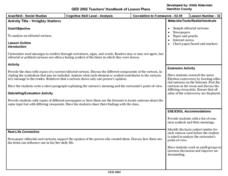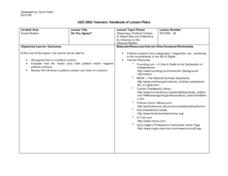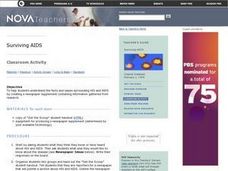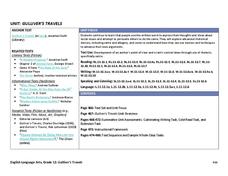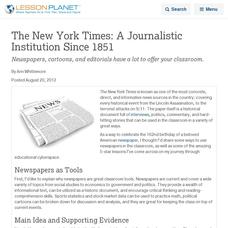Curated OER
Canada's Press: Making a Historical Newspaper
Young scholars examine several colonial-era editorial cartoons. They evaluate the effectiveness of the techniques the cartoonists used to display their messages and share one editorial cartoon with the class emphasising what message has...
Media Smarts
Tobacco Labels
Adolescents compare and assess the efficacy of tobacco product health warning labels from around the world. In groups, they invent warnings and create labels that would be effective for teens and children. Discussion covers advertising...
Curated OER
Working Women of WWII: Primary Documents: The Editorial Cartoon
Students examine the role of women in the workplace during World War II. They identify social conflicts, view and analyze editorial cartoons, participate in a group discussion, and answer discussion questions.
Curated OER
Weighty Matters
Students analyze political cartoons, and write short paragraphs explaining the cartoon's meaning and the cartoonist's point-of-view.
Curated OER
Newspaper Lesson Plan
Students create a newspaper in order to examine the process and impact of political revolutions. In this newspaper lesson, student analyze the impact of selected revolutions while discussing the language style of each newspaper. Students...
Curated OER
Political Cartoons
High schoolers explain that a political cartoon is very much like an editorial--both present personal opinions. Each student writes an editorial that supports the political cartoon. They must analyze the cartoon in order to write about...
Curated OER
The Civil Rights Movement
Students analyze the tensions that existed in American society during the Civil Rights Era as well as the problems that children experienced. They evaluate editorial cartoons dealing with the American Civil Rights movement to view the...
Curated OER
The Panic of 1837 And the Presidency of Martin Van Buren
Students analyze period political cartoons as they study the causes of the Panic of 1837. They use primary sources to evaluate President VanBuren's response to the panic and public opinion of the results of his policies. Then they...
Curated OER
Separate is Not Equal
Students use political cartoons and editorials to study Brown v. Board of Education. In this Brown v. Board of Education lesson, students read the background information on eight cartoons and editorials for a study on Brown v. Board of...
Curated OER
Drawing on Terror
Students assess the ways in which editorial cartoons offer insight into events that shape our world, specifically focusing on the September 11, 2001 terrorist attacks on the United States.
Curated OER
Breaking the Code: Actions and Songs of Protest
Students listen to and discuss the purpose of protest music. They analyze an editorial cartoon related to Jim Crow and read questions from the literacy tests given to African-Americans. They work together to write a song about the...
Curated OER
Fact or Opinion?
Third graders design a political cartoon. In this fact and opinion activity, 3rd graders examine political cartoons and distinguish fact from opinion. Students create a political cartoon on the topic of their choice.
University of Pennsylvania
Using Comic Strips to Teach Multiple Perspectives
Scholars view comics from two different perspectives; one paints the Alfred Dreyfus as innocent, while the other portrays the exact opposite. They solve the mystery of what happened by analyzing the source, working in groups, and...
Curated OER
Through the Eyes of Others
Students consider perspective as they analyze a political cartoon. In this media awareness lesson, students use the provided discussion questions to explore the meaning of the political cartoon "The Scream," by Edvard Munch.
Curated OER
Studying the Use and Effect of Media
Students consider mediums used to explore current issues. In this media awareness instructional activity, students use a Venn diagram to compare the meaning of the painting "The Scream," to that of a selected political cartoon.
Curated OER
Do You Agree?
Students recognize bias in a political cartoon, evaluate how the media uses both positive and/or negative political cartoons, and assess the influence a political cartoon can have on a person.
Curated OER
Surviving AIDS
Enhance your middle and high schoolers' research skills with this instructional activity. After viewing a video clip about HIV and AIDS, high schoolers identify the facts and issues surrounding the disease. They work together to create a...
Curated OER
Why Is Evolution Controversial?
Students examine the legal side of the teaching of evolution. They study the Scopes Trial and reflect on what it means for a teacher to be denied the right to teach a key scientific concept. In addition, they design their own editorial...
Louisiana Department of Education
Gulliver’s Travels
Gulliver's Travels tells the story of a man who goes on voyages and encounters strange people. A unit plan introduces readers to the classic text, as well as excerpts from other examples of sarcasm and satire, such as "A Modest Proposal"...
Benjamin Franklin Tercentenary
B. Franklin, Printer and the Public Eye
Students explore U.S. history by researching famous Americans. In this Benjamin Franklin lesson plan, students read portions of a biography about Franklin and identify his position within U.S. politics and as a leader in the battle for...
City University of New York
Women's Suffrage and World War I
Democracy cannot exist where not everyone has equal rights. Discuss the state of democracy and women's suffrage during World War I with class discussions, debates, and primary source analysis, in order for class members to connect with...
Curated OER
The Vietnam War
Students acquire information about the Vietnam War Era from the internet, textbook and various sources. They transfer the information that they have acquired into a newspaper format. Students create editorials, cartoons, graphics and...
Curated OER
The New York Times: A Journalistic Institution Since 1851
Newspapers, cartoons, and editorials have a lot to offer your classroom.
Curated OER
Where's My Funny Paper?
High schoolers identify main idea of passages, reading selections, and cartoons.





